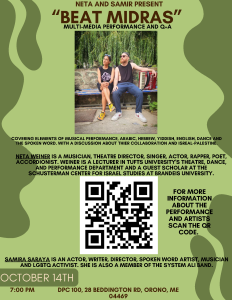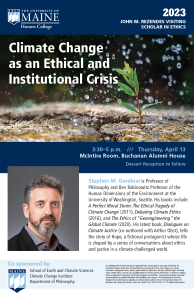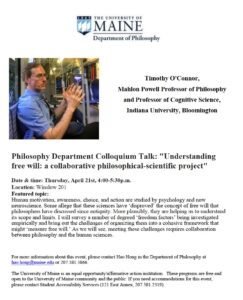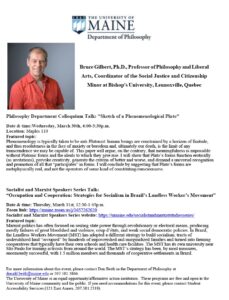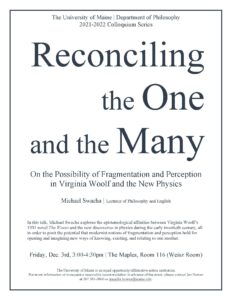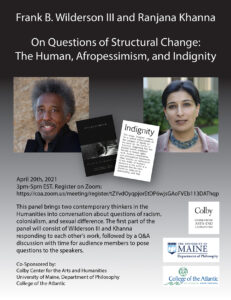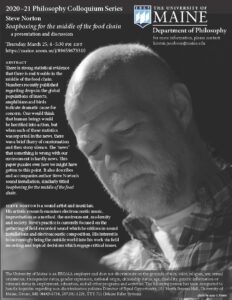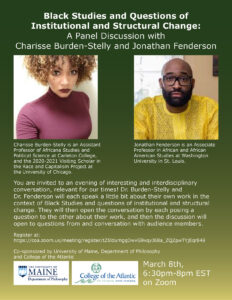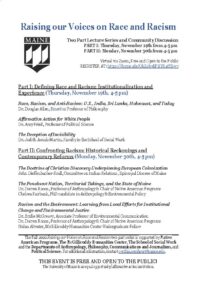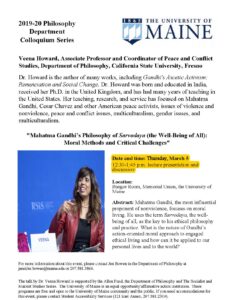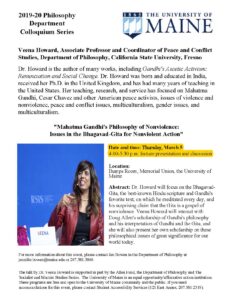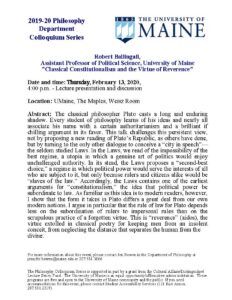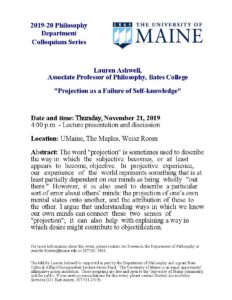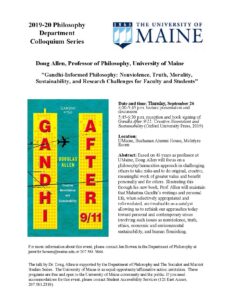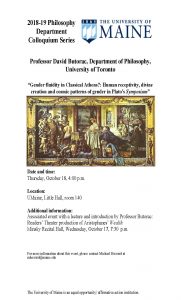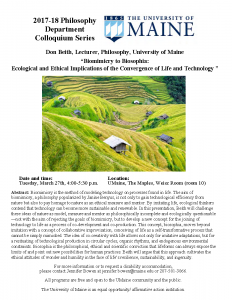News & Events
FALL 2024
Beat Midras
100 Donald P. Corbett
October 14th 7:00 PM
UMaine Philosophy and Judaic Studies present “Beat Midras,” a multilingual multimedia performance by Neta Weiner and Samira Saraya, an Israeli and Palestinian duo. Admission is free to all.
Neta and Samira will perform segments of one of their recent works, “Beat Midras,” along with a musical and spoken word multilingual performance, followed by a conversation with the audience. “Beat Midras” is a word play between the Jewish concept of Beit Midrash, a Jewish religious-intellectual discursive space; madāris/madrassa, the Arabic name for an educational institution (secular or religious); and the sonic, rhythmic and musical meanings of the English word beat. Broadly, this work investigates multi-languaging and the politicization of the linguistic public sphere via various performative and creative traditions, including spoken word, martial arts, and beatboxing. More specifically, they explore the relationships between language, vocal production and movement in Israeli-Palestinian contexts as well as in terms of gender formation.
Neta Weiner and Samira Saraya have collaborated for more than a decade in a range of artistic projects, sharing the stage in Jaffa, Tel Aviv, Salzburg, Berlin and New York, among other places. Their work demonstrates the role of art in opening up questions and facilitating conflictual dialogues and collaboration, and examines the boundaries between text, body and voice while addressing contexts of political violence in Israel-Palestine.
Neta Weiner is a musician, theatre director, singer, actor, rapper, poet, accordionist, and the artistic director of “Beit System Ali,” a multi-lingual hip-hop project. He was born in Kibbutz Givat Haim in 1987. Weiner has created and acted in several critically acclaimed and award-winning stage works produced for festivals and prominent theaters worldwide. As a musician, he wrote the soundtrack for the acclaimed TV teen series “Madrasa” (meaning “school” in Arabic). Weiner is a lecturer in Tufts University’s Theatre, Dance, and Performance Department and a guest scholar at the Schusterman Center for Israel Studies at Brandeis University.
Samira Saraya is an actor, writer, director, spoken word artist, musician and LGBTQ activist. She was born in Haifa in 1975. In her early twenties, she began performing as a drag king while working as a nurse. She won the Acco Festival Award for unique acting in 2012; Fringe Theatre Award for 2015 and 2017; Best Actress Award in the 2017 Jerusalem Film Festival (JFF); and the Best Script Award for her short film Polygraph of 2018 at TLVFest. Samira graduated from Tel Aviv University with a degree in directing and debuted with Polygraph in 2020. She is also a member of the System Ali band.
Keywords:
Musical performance in Arabic, Hebrew, Yiddish and English Dance
Spoken Word
Discussion about their collaborations and Israel-Palestine
Agency and Reasoning in Games, University of Maine – Friday, September 27th and Saturday, September 28th.
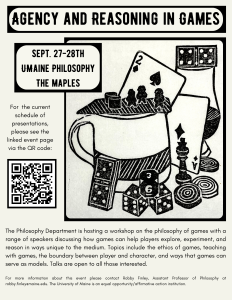 The aim of this workshop in the philosophy of games is to provide a space for discussion of how games can play a role in helping players explore, experiment, and reason in ways that are unique or well-suited to games (including video games, board games, role-playing games, party games, etc.).
The aim of this workshop in the philosophy of games is to provide a space for discussion of how games can play a role in helping players explore, experiment, and reason in ways that are unique or well-suited to games (including video games, board games, role-playing games, party games, etc.).
Schedule of Talks:
Friday, September 27th
Session 1: Boundaries between Games and Agents (Maples, Virtue Room – 2nd Floor)
9-9:50: Alexander Carty (McGill University), “Video Games and Hypocritical Blame”
10-10:50: Ida Miczke and Reid Kurashige (University of Warsaw and UC Berkeley), “From Play to Morality: Games as a Model for Partially Self-Effacing Ethical Theories”
11-11:50: Keilee Bessho (UC Riverside), “Creating Winning Conditions: In Games and Beyond”
Lunch Break, 12-12:55pm
Session 2: Play and Goals (Maples, Virtue Room – 2nd Floor)
1-1:50: Ronni Gura Sadovsky (Trinity University), “The Grading Scheme as a Scoring System”
2-2:50: Mark Jensen and Nathan Jensen (U.S. Air Force Academy and Colorado School of Mines), “Playing Games and Gaming Play: Navigating the Intersection of Concepts in Tension”
3-3:50: Nicholas Baima and Sarah Malanowski (Florida Atlantic University), “Tryhards, Cheats, and the Playing the META”
Saturday, September 28th
Session 3: Acting in Games (Maples, Virtue Room – 2nd Floor)
9-9:50: Gareth Fuller (UMaine Farmington), “Teaching Compassion Through Games”
10-10:50: Luke Ford (The New School), “Bad Games for Bad People: Playing at the Edge of Taste”
11-11:50: Tobias Flattery (Wake Forest University), “May Nguyenian Kantians Commit Virtual Killings?”
Lunch Break, 12-12:55pm
Session 4: Games as Models (Maples, Virtue Room – 2nd Floor)
1-1:50: Andrew Kingston (Maine Maritime Academy), “Stars in the Dice: Cosmic Contingency in the History of Stochastic Games”
2-2:50: Ricky Mouser (John Hopkins University), “Quantification is Commensuration”
3-3:50: Robby Finley (UMaine Orono), “Games and Logic: Tool, Model, or More?”
John Garner, Associate Professor of Philosophy, University of West Georgia
Title: Imagination, Belief, and an Ethics of Disclosure
When: Thursday, April 11th 4:00-5:30 pm
Where: Deering Hall, 113 The University of Maine
Abstract: Can imagination justify beliefs? This paper surveys a recent debate in philosophy of mind and brings it into dialogue with Proclus’s notion of mathematical imagination. Imagination for Proclus mediates intellect and perception and reveals a unique level of reality. While the contemporary debate, focused on concepts such as instructive versus transcendent imagining and propositional versus doxastic justification, seems not to require the fifth century Platonist’s ontological commitments, I argue that his imagination would satisfy the debate’s demand for specifically imaginative ‘constrainers’. The paper concludes by linking Proclus’s imagination more broadly to the need for an existentially integrated and evidentially committed life.
Fall Semester
Aubree Nygaard: Outstanding Graduating Student
Aubree Nygaard of Brunswick, Maine is the Outstanding Graduating Student in the College of Liberal Arts and Sciences. Nygaard is a double-major in computer science and philosophy whose numerous academic awards include the Non-Traditional Student Scholarship and the Roger B. Hill Humanities Scholarship. Since 2019, she has been a developer and student representative in the Virtual Environment and Multimodal Interaction Lab (VEMI Lab), where she has collaborated on research focused on an iOS autonomous vehicle ride-sharing app and other projects involving human computer interaction, virtual reality and information access, specifically for blind or visually impaired people. She has co-authored two peer-reviewed papers in the field of privacy research. Nygaard has been a Maine Learning Assistant, and a research assistant in the Privacy Engineering — Regulatory Compliance Lab (PERC_Lab), and for professor Hao Hong in the Philosophy Department. From 2019–21, she served as vice president for the UMaine chapter of the Association for Computing Machinery’s Council on Women in Computing. Following graduation, Nygaard will pursue a career in software development.
Levinson Ambassador Newsletter
Spring 2022
Department of Philosophy Colloquium Series 2021-22
Spring Semester
Timothy O’Connor, Mahlon Powell Professor of Philosophy and Professor of Cognitive Science, Indiana University, Bloomington
“Understanding free will: a collaborative philosophical-scientific project”
Date & time: Thursday, April 21st, 4:00-5:30p.m.
Location: Winslow 201Featured topic: Human motivation, awareness, choice, and action are studied by psychology and now neuroscience. Some allege that these sciences have ‘disproved’ the concept of free will that philosophers have discussed since antiquity. More plausibly, they are helping us to understand its scope and limits. I will survey a number of degreed ‘freedom factors’ being investigated empirically and bring out the challenges of organizing them into a cohesive framework that might ‘measure free will.’ As we will see, meeting these challenges requires collaboration between philosophy and the human sciences.
Bruce Gilbert, Ph.D., Professor of Philosophy and Liberal Arts, Coordinator of the Social Justice and Citizenship Minor at Bishop’s University, Lennoxville, Quebec
Sketch of a Phenomenological Plato.
WHEN: Wednesday, March 30th, 4:00-5:30pm
WHAT: Sketch of a Phenomenological Plato.
WHERE: The Maples, Room 110 (Weisz Room)
Phenomenology is typically taken to be anti-Platonist: human beings are constrained by a horizon of finitude, and thus resoluteness in the face of anxiety or boredom and, ultimately our death, is the limit of any transcendence we may be capable of. This paper will argue, on the contrary, that meaningfulness is impossible without Platonic forms and the ideals to which they give rise. I will show that Plato’s forms function erotically (as invitations), provoke creativity, generate the criteria of better and worse, and demand a universal recognition and promotion of all that “participates” in forms. I will conclude by suggesting that Plato’s forms are metaphysically real, and not the operators of some kind of constituting consciousness.
Fall Semester
Michael Swacha | Lecturer of Philosophy and English, University of Maine
Reconciling the One and the Many, On the Possibility of Fragmentation and Perception in Virginia Woolf and the New Physics.
WHEN: Friday, Dec. 3rd, 3:00-4:30pm
WHAT: Reconciling the One and the Many, On the Possibility of Fragmentation and Perception in Virginia Woolf and the New Physics
WHERE: The Maples, Room 116 (Weisz Room)
In this talk, Michael Swacha explores the epistemological affinities between Virginia Woolf’s 1931 novel The Waves and the new discoveries in physics during the early twentieth century, all in order to posit the potential that modernist notions of fragmentation and perception hold for opening and imagining new ways of knowing, existing, and relating to one another.
Robby Finley, Assistant Professor of Philosophy, University of Maine
Disagreement about Logic: Using Foundational Debates to Reconsider Theory Choice in Logic
WHEN: November 12th, 3pm-4:30pm EDT
WHAT: Disagreement about Logic: Using Foundational Debates to Reconsider Theory Choice in Logic
WHERE: The Maples, Weisz Room (Room 110)
Recent work in philosophy of logic has focused on whether it is possible to revise logic and how one could justify such revisions. In order to justify a revision of logic, it seems like you should consider arguments for revision, but you must presuppose some logic to evaluate any such arguments! In this talk, I will first introduce a framework for theory choice in logic that suggests such justifications are abductive. Recent defenders of such a framework have argued that logic is “unexceptional” and theory choice in logic is analogous to scientific theory choice. I argue that this is not quite right: the correct process may be abductive, but logic nevertheless has unique theoretical virtues that motivate theory choice. To do so, I turn to some cases of disagreement about logic from debates within the foundational crisis in mathematics. These reveal competing views about the role and virtues of logic that can help us formulate a better abductive framework.
Department of Philosophy Colloquium Series 2020-21
Spring Semester
A Panel discussion with Frank B. Wilderson III and Ranjana Khanna
On Questions of Structural Change: The Human, Afropessimism, and Indignity
*Recording of 3/25 event – https://drive.google.com/file/d/1cL_4Hj8M9MUW0zoQV6ajxkspdUPh2W5C/view?usp=sharing
WHEN: April 20th, 3pm-5pm EDT
WHAT: A Panel discussion with Frank B. Wilderson III and Ranjana Khanna
On Questions of Structural Change: The Human, Afropessimism, and Indignity
WHERE: Zoom Registration required: https://coa.zoom.us/meeting/register/tZYvdOyqpjorEtDP6wjsGAoFVEb113DAThqp
This event is co-sponsored by the Colby Center for the Arts and Humanities, the University of Maine, Philosophy Department, and College of the Atlantic.
This panel brings two contemporary thinkers in the Humanities, Frank B. Wilderson III and Ranjana Khanna, into conversation about questions of racism, colonialism, and sexual difference. Wilderson and Khanna both engage critically with notions of the human. Wilderson has argued that Humanist thought and its material implications are dependent on Black death; he suggests that within this configuration, “Human Life is dependent on Black death for its existence and for its conceptual coherence.” Wilderson offers Afropessimism as an analytic lens, arguing that it shows an irreconcilable difference between the violence of capitalism, gender oppression, White supremacy and colonialism on the one hand, and the violence of anti-Blackness on the other. Khanna has argued for a radical reassessment of the use of dignity as the basis for understandings of the human. She proposes instead a consideration of the human in terms of disposability. Through psychoanalytic, feminist, Marxist and literary analyses, Khanna offers an approach to questions of political change and justice through a focus on moments of dissolution that challenge rather than reinforce the rights-bearing liberal subject and humanist assumptions of “sameness and consistency as being the mark of signature, personhood, humanness, autonomy, or life itself.”
Although Wilderson and Khanna are both informed by an overlapping archive in Marxist and psychoanalytic thought, they offer different provocations, and arrive at different arguments and questions. Both consider subjectivity through analyses of racism, colonialism, capitalism and sexual difference that attend to structural relations and the legacies of humanist notions of the human. A conversation between them thus promises to be generative for a diverse audience, and particularly timely for the current political moment. The first part of the panel will consist of Wilderson III and Khanna responding to each other’s work, with a focus on two texts: “The Trouble with Humans” (from Afropessimism) and “Indignity.” The second part of the panel will be a Q&A discussion, with time for audience members to pose questions to the speakers.
Frank B. Wilderson III
Frank B. Wilderson III is Chancellor’s Professor and Chair of African American Studies, and a core faculty member of the Culture & Theory Ph.D. Program at UC Irvine; and an award-winning writer whose books include Afropessimism (Liveright/W.W. Norton 2020); Incognegro: A Memoir of Exile and Apartheid(Duke University Press 2015); and Red, White, & Black: Cinema and the Structure of U.S. Antagonisms (Duke University Press 2010). He spent five and a half years in South Africa, where he was one of two Americans to hold elected office in the African National Congress during the apartheid era. He also was a cadre in the underground. His literary awards include The American Book Award; The Zora Neale Hurston/Richard Wright Legacy Award for Creative Nonfiction; The Maya Angelou Award for Best Fiction Portraying the Black Experience in America; and a National Endowment for the Arts Literature Fellowship. As of September 29, 2020, his book Afropessimismhas been Long Listed for the National Book Award (Nonfiction category). Wilderson was educated at Dartmouth College (A.B Government and Philosophy), Columbia University (MFA/Fiction Writing), and UC Berkeley (PhD/Rhetoric).
Ranjana Khanna
Ranjana Khanna is Director of the John Hope Franklin Institute, Professor of English, Literature, and Gender, Sexuality and Feminist Studies at Duke University, and the incoming second vice-president of the American Comparative Literature Association. Khanna is a literary critic and theorist recognized for her interdisciplinary, feminist, and internationalist contributions to the fields of post-colonial studies, feminist theory, and postcolonial literature and the visual arts. She is best known for her work on melancholia and has also published on film, Algeria, area studies, autobiography, Marxism, and visual and feminist theory. Khanna is the author of Algeria Cuts: Women and Representation, 1830-Present (2007) and Dark Continents: Psychoanalysis and Colonialism (2003). Her articles have been published in a wide range of journals, including Differences, Signs, Third Text, Diacritics, Screen, Art History, positions, SAQ, Feminist Theory, and Public Culture. Her book manuscripts in progress are titled: Asylum and Unbelonging.Khanna served as the Margaret Taylor Smith Director of Gender, Sexuality and Feminist Studies at Duke from 2007–2015.
Audience members are encouraged to read the linked texts before the panel session.
Wilderson Chapter Five Afropessimism
Steve Norton: Soapboxing for the middle of the food chain, a presentation and discussion
*Recording of 3/25 event –https://maine.zoom.us/rec/share/TLV0M5rO62P2Bm1vzZ5bVtz2bmXXR7sdDTXe5ceOmOgQBKPlRFl_s_7pRBzdEbXW.r0Rq1FWrpqBAqM8L
When: Thursday, March 25, 4 – 5:30 pm edt
What: There is strong statistical evidence that there is real trouble in the middle of the food chain. Numbers recently published regarding drops in the global populations of insects, amphibians and birds indicate dramatic cause for concern. One would think that human beings would be horrified into action, but when each of these statistics was reported in the news, there was a brief flurry of consternation and then stony silence. The “news” that something is wrong with our environment is hardly news. This paper puzzles over how we might have gotten to this point. It also describes and accompanies author Steve Norton’s sound installation, similarly titled Soapboxing for the middle of the food chain.
Where: Zoom link https://maine.zoom.us/j/89659673310
Steve Norton is a sound artist and musician. His artistic research examines electroacoustic music, improvisation as a method, the environment, modernity and society. Steve’s practice is currently focused on the gathering of field-recorded sound which he utilizes in sound installations and electroacoustic composition. His interest is to increasingly bring the outside world into his work via field recording and topical decisions which engage critical issues.
**Audience members are encouraged to read the below texts (PDFs attached) prior to the event.
https://umaine.edu/philosophy/wp-content/uploads/sites/99/2021/03/Norton-Talk-Reading.pdf
Black Studies and Questions of Institutional and Structural Change: A Discussion with Charisse Burden-Stelly and Jonathan Fenderson
*Recording of 3/8 event – https://drive.google.com/file/d/1_BGjDrmd16uelPZkqryI1S2qhvNlfmJo/view
When: Monday, March 8th, 6:30pm-8pm EST
What: An evening of interesting and interdisciplinary conversation, relevant for our times! Dr. Burden-Stelly and Dr. Fenderson will each speak a little bit about their own work in the context of Black Studies and questions of institutional and structural change. They will then open the conversation by each posing a question to the other about their work, and then the discussion will open to questions from and conversation with audience members.
Where: Zoom (registration required: register at the below link)
https://coa.zoom.us/meeting/register/tZEldumgqDwvG9xqyJ68a_ZQZpwTYjEqr849
This event is co-sponsored by the Philosophy Department at the University of Maine and by College of the Atlantic. It will be co-hosted by Kirsten Jacobson and Netta van Vliet, along with students from both institutions.
Charisse Burden-Stelly is an Assistant Professor of Africana Studies and Political Science at Carleton College, and the 2020-2021 Visiting Scholar in the Race and Capitalism Project at the University of Chicago. Burden-Stelly completed her Ph.D. in African Diaspora Studies at the University of California, Berkeley in 2016. Her scholarship traverses African Studies, Critical Theory, Political Theory, and Political Economy with a focus on antiradicalism, anti-blackness, and state-sanctioned violence; globalization and economic development; and epistemologies of Black Studies. She is the co-author, with Dr. Gerald Horne, of W.E.B. Du Bois: A Life in American History, and her published work also appears in a wide range of journals, including Small Axe, Souls, Du Bois Review, Socialism and Democracy, International Journal of Africana Studies, and the CLR James Journal.
Jonathan Fenderson is an Associate Professor in African and African American Studies at Washington University in St. Louis. He earned his PhD in the W.E.B. Du Bois Department of Afro-American Studies at the University of Massachusetts. His research and teaching interests emanate from three themes: intellectual history, social movements, and transnational links between Africa and the Diaspora. He is the author of Building the Black Arts Movement: Hoyt Fuller and the Cultural Politics of the 1960s (2019), as well as of essays in numerous journals and edited volumes.
**Audience members are encouraged to read the below texts (PDFs attached) prior to the event.
Fenderson, Jonathan. “Black Studies Post-Janus.” The Black Scholar, vol. 48, no.4, 2018, pp.1-7.
Questions?: Contact Netta van Vliet (nvanvliet@coa.edu) or Kirsten Jacobson (kirsten.jacobson@maine.edu)
Raising our Voices on Race and Racism
Two Part Lecture Series and Community Discussion
Part I: Thursday, November 19th from 4-5 pm
Part II: Monday, November 30th from 4-5 pm
Virtual via Zoom, Free and Open to the Public
REGISTER AT: https://forms.gle/QkZobyEPXYRatYBw7
Department of Philosophy Colloquium Series 2019-20
Spring Semester
Veena Howard, Associate Professor and Coordinator of Peace and Conflict Studies, Department of Philosophy, California State University, Fresno
“Mahatma Gandhi’s Philosophy of Sarvodaya (the Well-Being of All): Moral Methods and Critical Challenges”
Date and time: Thursday, March 5
12:30-1:45 p.m. lecture presentation and discussion
Location: Bangor Room, Memorial Union, the University of Maine
Veena Howard, Associate Professor and Coordinator of Peace and Conflict Studies, Department of Philosophy, California State University, Fresno
“Mahatma Gandhi’s Philosophy of Nonviolence: Issues in the Bhagavad-Gita for Nonviolent Action”
Date and time: Thursday, March 5
4:00-5:30 p.m. lecture presentation and discussion
Location: Bumps Room, Memorial Union, the University of Maine
Robert Ballingall, Assistant Professor of Political Science, University of Maine “Classical Constitutionalism and the Virtue of Reverence”
Date and time: Thursday, February 13, 2020,
4:00 p.m. – Lecture presentation and discussion
Location: UMaine, The Maples, Weisz Room
Department of Philosophy Colloquium Series 2019-20
Fall Semester
Thursday, November 21, 2019 – 4:00 p.m. – UMaine, The Maples, Weisz Room
Lauren Ashwell, Associate Professor of Philosophy, Bates College
“Projection as a Failure of Self-knowledge”
Thursday, September 26, 2019 – 4:00 p.m. – UMaine, Buchanan Alumni House, McIntyre Room
Doug Allen, Professor of Philosophy, University of Maine
“Gandhi-Informed Philosophy: Nonviolence, Truth, Morality, Sustainability, and Research Challenges for Faculty and Students”
Department of Philosophy Colloquium Series 2018-2019
Fall Semester
Thursday, November 8, 2018 – 4:00 p.m. – UMaine, Donald P. Corbett Hall, room 107
Robby Finley, Ph.D. Candidate, Columbia University
“Aristotle on Infinity: Senses of Potentiality Underlying the View”
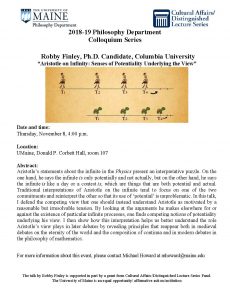
Thursday, October 18, 2018 – 4:00 p.m. – UMaine, Little Hall, room 140
Professor David Butorac, Department of Philosophy, University of Toronto
“Gender fluidity in Classical Athens?: Human receptivity, divine creation and cosmic patterns of gender in Plato’s Symposium”
See our UMaine Department of Philosophy, The Maples Facebook site.
Department of Philosophy Colloquium Series 2017-2018
Spring Semester
Tuesday, March 27, 2018 – 4:00 pm – 5:30 pm – The Maples, Weisz Room
Don Beith, Lecturer, Philosophy, University of Maine
“Biomimicry to Biosophia: Ecological and Ethical Implications of the Convergence of Life and Technology ”
Friday, March 30, 2018 – 12:00 pm – 1:30 pm – The Maples, Weisz Room
Chris Cohoon, Senior Faculty Fellow in the Humanities, University of King’s College (Dalhousie University)
“The Ecological Levinas: From Face to Food”
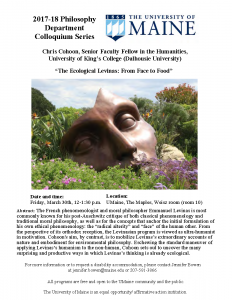
Tuesday, April 3, 2018 – 4:30 pm -6:00 pm – The Maples, Weisz Room
Dr. Susan Bredlau, Assistant Professor of Philosophy, Emory University
“Demanding Experience: Dewey and Beauvoir on Habit, Institution and Freedom”

Friday, March 23, 2018 – 12:00 pm-1:30 pm – The Maples, Weisz Room
Russell Duvernoy, Instructor, Philosophy, Seattle University
“Becoming Ecological: Towards a Process Metaphysical Subjectivity”
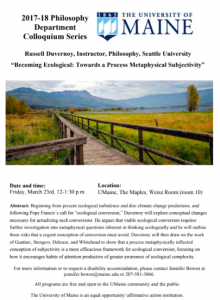
Tuesday, March 20, 2018 – 4:30 pm -6:00 pm – The Maples, Weisz Room
Bryan Bannon, Associate Professor & Director of Environmental Studies, Merrimack College
“Friendship of Reflective Environmental Practice”
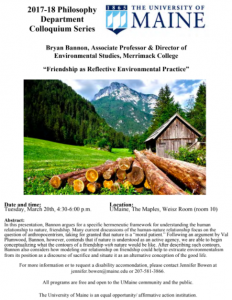
Fall Semester
Thursday, November 9, 2017
Joseph Forte, Ph.D. Northeast Catholic College
“The Three Turns of the Allegory of the Cave”
Other Department News
Professor Kirsten Jacobson received the 2015 Presidential Outstanding Teaching Award at the University of Maine, and was the Outstanding Faculty Member in the area of Teaching and Advising for 2015.
Professor Kirsten Jacobson was on sabbatical on a sailing voyage in 2012-13. Here is a story from the Bangor Daily News.
Professor Michael Howard was selected as the Outstanding Faculty Member in the area of Teaching and Advising for 2012.
Philosophy Professors in UMaine Today on the 2008 Elections: Two Philosophy faculty, along with faculty from other departments, wrote short articles for UMaine Today on the 2008 elections, and were interviewed. Click on the links below to read the articles or see the videos:
- Mike Howard on the 2008 elections in UMaine Today, article and videos
- Doug Allen on the 2008 elections in UMaine Today, article and videos
More articles:
- Jessica Miller on biomedical dilemmas concerning healthcare in rural areas in UMaine Today
- Doug Allen on Hind Swaraj, Gandhi’s most important book, podcast
- Mike Howard on Environmental Justice and Climate Change, video
- Kirsten Jacobson on neuroses as disorders of the body in space, UMaine Today article
- Jessica Miller on bioethics of the undead, Bangor Daily News article
- Phillosophy Department Newsletter for Spring 2010 (PDF)
- Philosophy in the News

